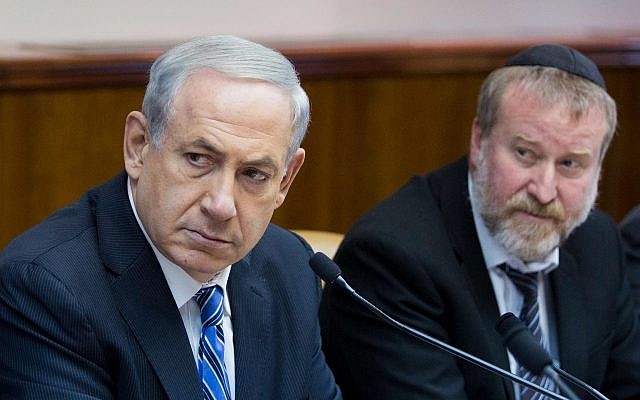Netanyahu Charges Complicate Government Creation
Israeli Attorney General Avichai Mendelblit could make another earth-shattering ruling: Whether or not the indictment renders him ineligible to form a government
After dropping a bombshell last week with his announced indictments against Prime Minister Benjamin Netanyahu, Israeli Attorney General Avichai Mendelblit this week could conceivably make another earth-shattering ruling: Whether or not the indictment rendered Netanyahu ineligible to form a new government.
After all, the unprecedented indictments of a sitting prime minister came during the historic instability of the Israeli government after two inconclusive elections – in April and in September – and the likelihood of a third election by March.
If Netanyahu is not allowed to lead his Likud party in establishing a coalition government, the party and the entire coalition-building process is thrown up in the air.
As it is, the Knesset is about a week into a mandated three-week period during which any Knesset member receiving a majority 61 votes can be chosen to try to put together a ruling government. That is, every Knesset member other than Netanyahu, if that’s what Mandelblit rules. The deadline for the Knesset to choose a candidate is 5 p.m. Atlanta time, Dec. 11.
Asked to comment about the political chaos in Israel, former Atlantan Rachel Broyde, who served as spokesperson for the Likud party during the elections this year, passed. “I am still figuring out my thoughts, so I think it’s best if I hold off on commenting for now,” she told the AJT.
Israeli TV station Channel 13 surveyed citizens immediately after the indictments were announced Nov. 21. Fifty-six percent said Netanyahu should resign, 35 percent said he should not, and 9 percent said they didn’t know.
Indeed, because the situation is so unprecedented, no one knows for sure what will unfold over the next few weeks or months. Already the Movement for Quality Government in Israel filed a petition with the Israeli High Court of Justice seeking Netanyahu’s removal from office. But the court rejected the petition on the grounds that the organization should have first asked the prime minister how he planned to respond to the corruption charges.
When this article was written, Netanyahu had not yet announced whether he intends to request immunity from the Knesset. That, in itself, is complicated because the request needs to go to a committee that has not even been created as no new government has been established since the election process started early this year.
Richard S. Walter, vice president of curriculum and outreach at the Center for Israel Education, hesitated to predict what will happen next because “the situation is still evolving. There is no doubt that the indictment announcement has weakened Netanyahu politically. Both public opinion polls and comments on and off the record by members of the Likud party show that the prime minister’s hold on both the country and his party are showing significant cracks. It’s still too early to know how this will play out.”

In fact, just three days after the indictments were announced, the Likud party agreed to hold primaries within six weeks, during which a new party leader may be chosen. At least one Likud member will run against Netanyahu for that leadership after the prime minister tried and failed to put together a government following two elections he instigated.
Walter pointed out that Netanyahu’s main competitor to lead the country, Blue and White party head Benny Gantz, has questioned Netanyahu’s ability to lead the country while defending himself in court.
Mandelblit announced this week that Netanyahu was not legally required to resign from leading the current “interim government.”
“The next few weeks will be interesting,” Walter told the AJT. “Will Netanyahu be able to fend off the internal challenges from within his party and survive both the 21-day period, and more importantly, remain head of the Likud for a still likely third election in March? Will the indictment force a change in Likud leadership, and could that break the deadlock between Likud and Blue and White with the Knesset designating Gantz or a new Likud leader with creating a government, and can they be successful in doing so?”
Almost certainly this week, Netanyahu will be required to give up holding his extra ministries of health, agriculture, Diaspora affairs and social affairs. “In past governments, ministers under indictment have been expected to step down from their posts,” Walter said. “However, there is no precedent regarding a prime minister.” He speculated that Israel’s supreme court may yet decide to weigh in on Netanyahu’s ability to lead while under indictment.
Moreover, if Netanyahu does relinquish those ministerial posts, it’s unclear who will head them. Some Knesset members have expressed hesitation about accepting such a job in an interim government from a prime minister tainted by corruption charges. At least in the case of the health ministry, that doesn’t seem to be a problem. Yaakov Litzman of the United Torah Judaism party has been deputy head of the health ministry. However, he may soon face charges that include bribery as well, with Mandelblit expected to announce that decision in the coming weeks.
According to Walter, “the big winner for now, perhaps in addition to Gantz, is Naftali Bennett [New Right party] who was recently appointed defense minister in the caretaker government, largely as a political move. Now with the potential that he will remain in that post until new elections, and Israel dealing with threats emanating from both Gaza and Iran in Syria, Bennett is suddenly in an important position and could boost his own profile ahead of the next election.”




comments